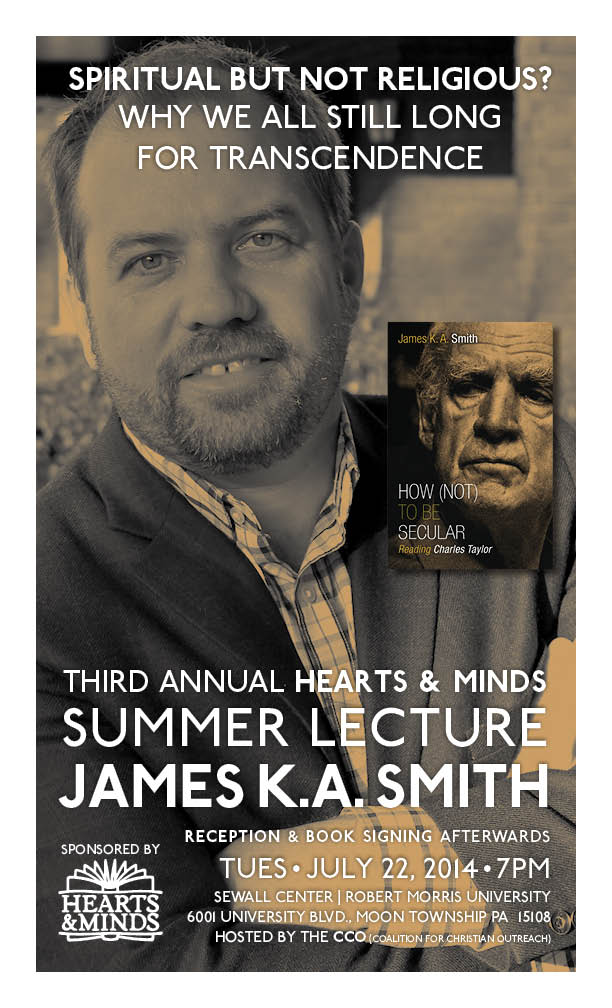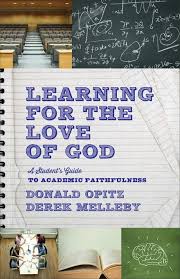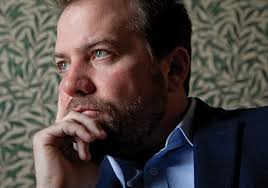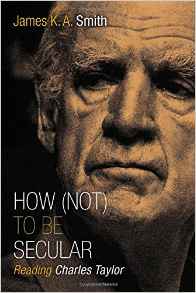 If you are friends with either Beth or I on Facebook, or a member of the Hearts & Minds Facebook group, or follow me on twitter, well, then, you know we are sponsoring a free public lecture with James K.A. Smith this Tuesday, July 22nd, in Pittsburgh. (See the poster below.)
If you are friends with either Beth or I on Facebook, or a member of the Hearts & Minds Facebook group, or follow me on twitter, well, then, you know we are sponsoring a free public lecture with James K.A. Smith this Tuesday, July 22nd, in Pittsburgh. (See the poster below.)
The CCO folks who do campus ministry are interested in almost everything, and they help college students relate evangelical Christian faith to the details of daily life. So we take theology and spiritual formation as well as books specifically about Christian engagement with art, film, music and culture. Of course we have books about higher education, that section on the tables anchored by the lovely little hardback Make College Count by Derek Melleby (Baker; $12.99) and Learning for the Love of God: A Guide for Students by Derek Melleby and Donald Opitz (Brazos Press; $14.99.) We will be with Steve Lutz, too, and of course will promote his great book for collegiates, King of the Campus (House Studio; $14.99.) We have a lot of books on how to help students gain a vision for their careers and callings, with titles on vocation and work, of course promoting Steve Garber’s rich, eloquent Visions of Vocation: Common Grace for the Common Good and the new paperback edition of Every Good Endeavor: Connecting Your Work to God’s Work by Tim Keller and Katherine Leary Aldsdorf (Dutton; $16.00.)
the tables anchored by the lovely little hardback Make College Count by Derek Melleby (Baker; $12.99) and Learning for the Love of God: A Guide for Students by Derek Melleby and Donald Opitz (Brazos Press; $14.99.) We will be with Steve Lutz, too, and of course will promote his great book for collegiates, King of the Campus (House Studio; $14.99.) We have a lot of books on how to help students gain a vision for their careers and callings, with titles on vocation and work, of course promoting Steve Garber’s rich, eloquent Visions of Vocation: Common Grace for the Common Good and the new paperback edition of Every Good Endeavor: Connecting Your Work to God’s Work by Tim Keller and Katherine Leary Aldsdorf (Dutton; $16.00.)
(Just notice how he uses music lyrics in this beautiful, new piece in Comment. Did I mention he edits Comment?)
 things in popular culture and, empowered by God’s grace and Spirit, dive deep into the real world around us, messy as it is. Almost like the Jewish exiles of old, we are called to help the flourishing of our world; we are called to know the world around us. That DVD we were promoting last week gets it right: For the Life of the World, indeed.
things in popular culture and, empowered by God’s grace and Spirit, dive deep into the real world around us, messy as it is. Almost like the Jewish exiles of old, we are called to help the flourishing of our world; we are called to know the world around us. That DVD we were promoting last week gets it right: For the Life of the World, indeed.
Maybe that is why you are a customer of Hearts & Minds, you want to support a business trying to work this stuff out, and help you in your own faith journey.

For these important reasons, although we are not “from” Pittsburgh, we go back to the Three Rivers to co-host with the CCO a public event that tries to illustrate and underscore, celebrate and extend this heritage of proclaiming the good news that all of life is redeemed. For some of us, it is what (drawing on Al Wolter’s influential Creation Regained, perhaps) we used to call a reformational worldview.
 As I mentioned, Professor James K.A. Smith captures much about contemporary culture, and he is very much in tune with music and art and architecture and movies; he experiences
As I mentioned, Professor James K.A. Smith captures much about contemporary culture, and he is very much in tune with music and art and architecture and movies; he experiencesand engages these artifacts from within his classic, historic, ecumenical, faith. He sometimes says he is Pentecostal — he wrote one serious book about being a Pentecostal philosopher called Thinking in Tongues (Erdmans; $19.00) although he is also a member of the Christian Reformed Church (he teaches at their flagship Calvin College in Grand Rapids.) In most of his writing, though, one senses a deep loyalty to the grand apostolic tradition, to the communion of the saints in the one, big Body of Christ; in his book Imagining the Kingdom: How Worship Works (Baker; $22.99) he offers a phenomenology of worship that is resonant with many of the best liturgical thinkers these days, Anglicans, Lutherans, Roman Catholics and the Orthodox, even. I guess he is a lower case c catholic and a capital K Kuyperian. In all of his body of work he is giving a fascinating and generative account of this grand story and how it can shape our deepest desires, our life and times and how we “do life” together in this 21st century as only such a faith-based philosopher can.
The topic he will be addressing at the CCO/Hearts & Minds Pittsburgh Summer Lecture is
 based on his very thoughtful recent book called How (Not) To Be Secular: Reading Charles Taylor (Eerdmans; $16.00.)
based on his very thoughtful recent book called How (Not) To Be Secular: Reading Charles Taylor (Eerdmans; $16.00.) This volume (if read widely) could have a major impact on the level of
theological leadership that our contemporary church is getting. It could
also have a great effect on the quality of our communication and
preaching.I highly recommend this book.
LINKS AND REVIEWS
Here are a handful of resources to help you learn more about Jamie Smith and some of his many books. I do hope that if you are anywhere near Pittsburgh this Tuesday, you’ll join the party. If not, watch these videos, order some books, and be with us in spirit. Thanks!
- Here is my sprawling BookNotes review of Smith and his book when How (Not) To Be Secular was released. I hope it helps.
- Here is a good interview with Smith about his new book. It is a bit heady at times (the young interviewer is obviously well read) but a great intro to the themes of the book. Just takes a few minutes to watch.
- Here is a broader, more general overview of Smith’s work that I did as I promoted his wonderful collection of essays called Discipleship in the Present Tense: Reflections on Faith and Culture (Calvin College Press; $14.99.) I love that book.
- Here is an hour-long, excellent talk Smith gave not long ago at a conference on worship, honoring the contributions of Robert Weeber. This is so good, and will help you see why you should read Desiring the Kingdom: Worship, Worldview, and Cultural Formation and Imagining the Kingdom: How Worship Works (Baker Academic; $22.99 each.) Learn and enjoy.
- Here is a splendid 3-minute intro to the project of these two books (there will be a third!) After watching that, you can see several other short takes on other aspects of these important books, especially the second. Wow. You will want to watch them more than once.
- Here is a short video about his lovely small paperback, Letters to a Young Calvinist: An Invitation to the Reformed Tradition James K.A. Smith (Brazos; $14.99) Several years ago, Smith weighed in on the discussions and debates about what Time magazine called, drawing on a book title by this name, the phenomenon of the “young, restless and Reformed.” Anyone observing the American religious landscape knows there has been a renewal of conservative Calvinistic theology, and many passionate young adults have their own heroes, authors, bloggers, church planters, many who are identifying themselves as seriously Reformed. Go to any evangelical conference and you’ll see young folks talking about Jonathan Edwards and the Westminster Confession or the latest trend in PCA hymnody. But it isn’t always pretty. Uh, yeah.
So, Jamie wrote this series of letters to a fictional young man and a young woman, which guides them through the strengths and weaknesses of this new interest in old Calvinism and frames their interest by the bigger question of their own spiritual growth and involvement in the broader church. Smith’s fondness for Augustine comes up, here, again, and it is warm and inspiring. These letters are theologically informed, pastoral, interesting, and very, very helpful for anyone wanting to grow in their faith. For those who care about these details, I tell folks that these letters draws the reader along, from Piper to Kuyper. I also tell customers that even if they are not young or not Calvinist, this has wisdom for which you will be grateful and glad. Letters… is a quiet little book that deserves a wide readership.
- Here is a review I did of Smith’s other very new book, Who’s Afraid of Relativism: Community, Contingency, and Creaturehood, which is part of the very important “The Church in Postmodern Culture” series. Smith did the first book in that series, the popular Who’s Afraid of Postmodernism: Taking Derrida, Lyotard, and Foucault to Church (Baker Academic; both $19.99.) Learn about them here — but come back and buy ’em from us. We stock the whole set, of course. Thanks.
Just use the link shown below, which will take you to our secure order form page.
Or, come to Robert Morris University near Pittsburgh this Tuesday and join the party.
Thanks to Ned Bustard of World’s End Images for the poster. He desires the Kingdom.

BookNotes
DISCOUNT
ANY ITEM MENTIONED
20% off
order here
takes you to the secure Hearts & Minds order form page
just tell us what you want
inquire here
if you have questions or need more information
just ask us what you want to know
Hearts & Minds 234 East Main Street Dallastown, PA 17313 717-246-3333
